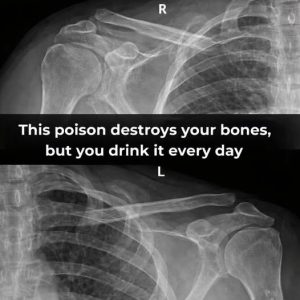Calcium is essential not only for bone strength but also for the proper functioning of the heart, muscles, and nerves. According to the Cleveland Clinic, it is the most abundant mineral in the human body, with over 99% stored in bones and teeth to provide structure. The remaining 1%—though small—plays a critical role in muscle function, nerve signaling, and blood circulation. Since the body doesn’t produce calcium naturally, it must be consumed through food, drinks, or supplements.
However, certain foods can actually deplete your body’s calcium stores, weakening your bones over time. One major culprit is soda, particularly colas, which contain phosphoric acid that blocks calcium absorption. High sugar levels in soda also increase inflammation, further degrading bone strength. Replacing soda with healthier drinks like herbal tea can support your calcium levels.
High sodium intake also harms calcium retention. Eating salty foods—like processed snacks, fast food, and packaged meals—causes more calcium to be lost through urine. To prevent this, it’s wise to reduce salt in your meals and read nutrition labels carefully to track sodium content.
Caffeine is another factor that drains calcium. Found in coffee, tea, and energy drinks, caffeine causes calcium to be excreted in urine. While one or two cups of coffee a day is generally safe, excessive consumption can gradually weaken bones and increase the risk of fractures.
Alcohol, especially in large amounts, can also interfere with calcium absorption. It slows down osteoblasts—the cells that form new bone—and lowers vitamin D levels, which are vital for calcium metabolism. Limiting alcohol to one drink daily for women and two for men can help preserve bone health.
Red and processed meats can also pose risks. These meats contain high levels of phosphorus, and when calcium intake is low, it creates an imbalance that may weaken bones. It’s best to enjoy red meat in moderation and prioritize lean proteins like chicken, fish, or plant-based options.
Lastly, even healthy foods like spinach and rhubarb contain oxalates that hinder calcium absorption. While they are nutritious, their oxalate content means the calcium they provide isn’t fully absorbed. Combining them with low-oxalate, calcium-rich vegetables like kale or broccoli can ensure your body still gets what it needs.





